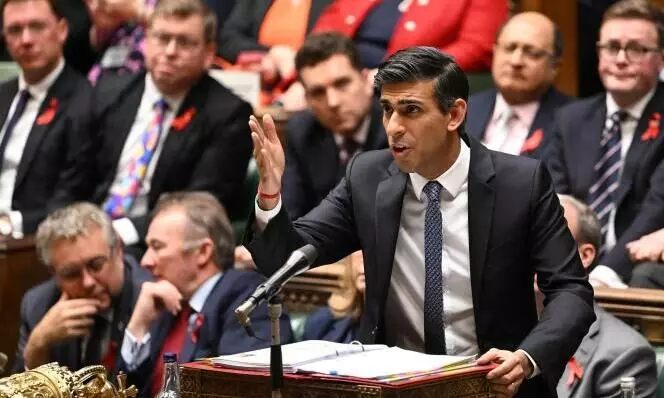
Labour party surging indeed, but .....
text_fieldsRight during the run-up to the election to British parliament, a large section of the media and political observers had already predicted the defeat of the Conservative Party led by Prime Minister Rishi Sunak and the return of the Labour Party. This prediction was evident to anyone observing the political developments in post-Brexit Britain. However, it would be an understatement to say that the election result merely proved these predictions correct. The Labour Party has come to power after 14 years, securing a historic victory beyond all expectations. In Britain, which has experienced intense political uncertainty since the Brexit announcement, the government led by Keir Starmer will remain in power for the next five years, barring any emergencies or miracles. Starmer's immediate statements following the victory announcement were noteworthy: his assertion that the country has lifted a significant burden and that the future holds days of national reconstruction cannot be dismissed as mere enthusiasm. There are clear indications in his words of the direction in which British politics will move in the coming days.
Starmer and his team are set to take the oath with 412 of the 650 seats in the House of Commons. On the other hand, the situation for the Conservatives, also known as the Tories, is dire: their number of seats has fallen by 244 from the previous election to 121, and many prominent figures have also been defeated. Among them is Rishi Sunak's predecessor, Liz Truss. Other Tory leaders, such as Jacob Rees-Mogg, Alex Chalk, Gillian Keegan, Johnny Mercer, Penny Mordaunt, and Grant Shapps, have also been swept away by the Labour Party wave. In fact, the only ones who stood their ground in the fiery contest were Home Secretary James Cleverly and Rishi Sunak. There is nothing surprising in this fall. This is the natural and inevitable decline of a party that has experienced political instability for the past decade, even while in power. Remember the situation in 2015 when David Cameron, the then Prime Minister, led the country to Brexit. He was not in favour of Britain's exit from Europe, but he had to give in to the pressure of the conservative sections of the party and the far-right in the country for a Brexit referendum. After 52% of the people voted in favour of Brexit in the referendum, he resigned. Later, there were futile attempts to implement Brexit in the country. In the meantime, the Conservatives, with the help of small parties in the election, retained power under the leadership of the Iron Lady Theresa May, but the conflicts in the country and within the party did not subside. However, the fact that the Conservatives continued their rule with a simple majority in the 2019 election under the leadership of the controversial Boris Johnson, who was Prime Minister until 2022, was seen as an indication of how much the country had shifted towards extremism and Islamophobia. Boris Johnson's rule, reminiscent of Trump in America, was no different. The same was true of Rishi Sunak who came later. In the meantime, it is the ordinary people of the country who have suffered. The reforms brought in the health and education sectors were not only a big failure, but the country's economy has also taken a nosedive, raising concerns. On the other hand, the Brexit plans have been failing miserably. The situation has reached a point where Britain is isolated in the region. Recognizing this danger, the people had no other option; they stood firm with the Labour Party. With Starmer understanding the favourable situation correctly and playing his cards well, the fall of the Tories was complete.
It is indeed a historic victory for the Labour Party, their most brilliant victory since 1997. Beyond that, it seems best to judge the outcome of this election as the Tories' colossal fall, which paved the way for Brexit and brought the country to the brink of ruin. The Labour Party, which has captured 65 per cent of the seats in Parliament, received only 35 per cent of the votes. This is a tahree per cent increase over the previous election. On the other hand, the Conservatives have almost halved their 43 per cent vote share from last time. In terms of vote share, the votes lost by the Tories did not go entirely to Labour. Many of these votes were captured by the Green Party and the far-right Reform UK. It is significant that Reform UK, led by far-right and anti-immigrant Nigel Farage, now has representation in the British Parliament. Therefore, while it is comforting that the Conservatives have been replaced by a pro-refugee and left-wing Labour Party, the presence of racists is very dangerous. It also remains to be seen how the Starmer administration, which has consistently taken a pro-Israel stance, will navigate this new political landscape.


















